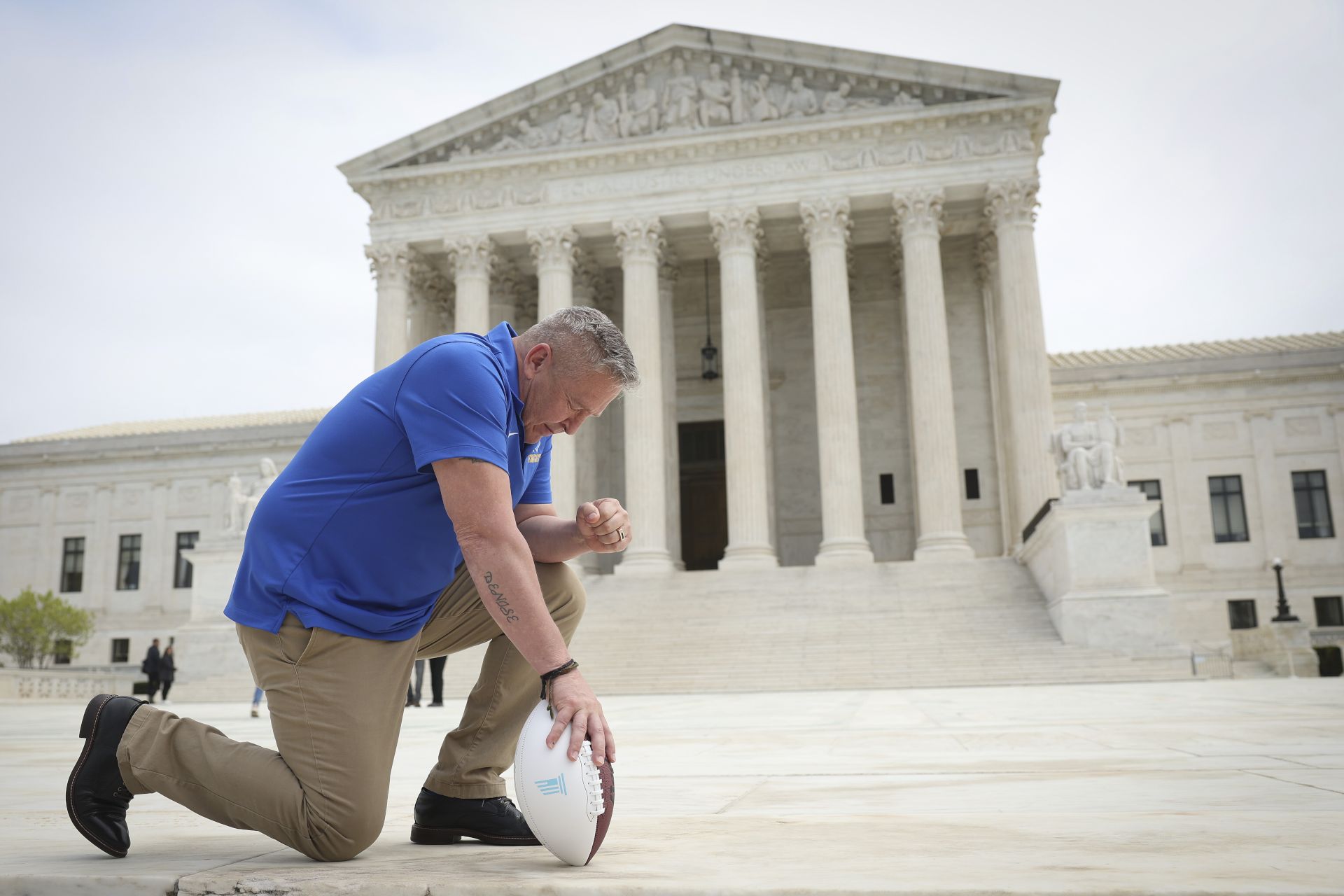Spotlight is a newsletter about underreported cultural trends and news from around the world, emailed to subscribers every Monday. Sign up here.
The recent U.S. Supreme Court’s decision in favor of a high school football coach who’d been fired for praying on the field after games has ignited a debate on the separation of church and state, one that has gained increased urgency amid a bevy of other decisions that have empowered the conservative religious right in America.
I have long been inoculated to displays of religiosity in sport. It is commonplace back home in Egypt for players to prostrate themselves in the pitch after scoring a goal, a piety that seems to have had little effect on the rest of society, where almost every woman has been sexually harassed. It has generally imbued me with a laissez-faire attitude when it comes to public expressions of faith (since they have little spreading effect), but it seems to have inflamed much of the liberal intelligentsia.
A quick recap: The coach had been praying for years after games, usually by himself, but students eventually joined him in the prayers, their participation levels varying from week to week. He was ultimately reprimanded for the prayers by the school district, per the First Amendment of the Constitution, which prohibits the government from endorsing a religion. At least one kid’s parents said that he had felt compelled to join the prayers or risk losing play time, though this complaint seemed somewhat nebulous to me, especially since participation in the prayers seemed to fluctuate. So it’s not clear to me what grounds there were to argue that there was some level of coercion involved. At any rate, the court sided with the coach, arguing that his free speech and expression rights that he exercised through prayer had been violated.
Those who supported the school district argued that the case was a major setback to the separation of religion and state, and framed the decision within the context of other court victories for the conservative right wing in America, such as last week’s overturning of Roe v. Wade and limits on gun control.
I first became aware of the case out of tangential interest in the commentary surrounding it. The liberal media intelligentsia in the U.S. is fond of reflexively comparing perceived regressive trends in society and politics, especially when it involves religion, to Muslim countries, such as arguing that regressive abortion laws are turning America into Taliban country. The problem with these comparisons isn’t that they are necessarily inaccurate (certainly many American fundamentalists speak in terminology that will put to shame many Salafist jihadists). It is that faraway Muslims and Arabs are reflexively seen as emblematic of a backwardness that in reality is simply a feature of American culture.
I have a general laissez-faire approach when it comes to free speech issues, so I cannot say that I’m against personal expressions of either religiosity or secularism. I live in Quebec, which has a secularism law that bars Muslims and Jews from wearing a hijab or yarmulke while doing public jobs, and it has always struck me as a petty expression of dominance rather than a meaningful separation between religion and state.
The case is interesting to me as well as a Middle Eastern observer, because expressions of piety are rife in sport where I come from. In Egypt, observant prayers often prostrate themselves after scoring a goal, both as an expression of religiosity and as a kind of virtue signaling. For the longest time this act was portrayed as that of a person who is “multazim” (religiously observant), and generally sports celebrities were encouraged to behave in this way because they were supposed to be examples for youth. (Never mind that this expression of faith did not prevent them from occasionally punching a rival team member or bar fans from chanting insults to players’ mothers, and it certainly does not seem to have had an effect on Egyptian society at large, where almost every woman living in Cairo has been sexually harassed.)
In fact, these expressions of religiosity are often praised, even in the West, as in the case of Liverpool star Mohamed Salah, who prostrates himself after scoring goals in Premier League stadiums and named his daughter after the holy city of Mecca. His actions have been praised for “normalizing” Muslim expressions of faith and culture because of his star power. The flip side is that when his behavior deviates from what is seen as the norm in Islamic orthodoxy, he is subject to condemnation. He was harshly criticized months ago for comments that were deemed insufficiently anti-alcohol and for participating in a photoshoot in GQ with Italian model Alessandra Ambrosio.
It is of course difficult to divorce an individual case from the broader context of a resurgent religious right, which can feel like an assault on the liberal way of life and secularism itself as a key pillar of democracy.
But I also don’t think it is wise to be outraged and fearful over every expression of the self that veers away from those precepts, because they were built to withstand a diversity of lived experiences.
For those who fear that the coach’s expression of religiosity and prayer on the field will somehow coerce youth to pray more or become more religious, there is the questionable solace in the fact that his behavior is unlikely to have a broader societal effect, much as Mo Salah’s devotion has had little effect on sexual harassment in Cairo.



